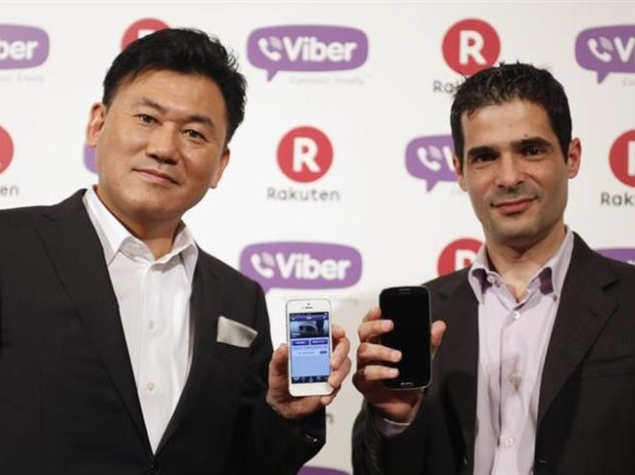Japan's Rakuten buying Viber Media for $900 million

The Japanese firm has been trying for years to counter a shrinking market at home and Viber's 280-million strong global customer base was key to expanding Rakuten's business, which include e-commerce, a baseball team, a web-based travel service and Internet bank, it said.
Viber's offerings let users make Internet-based calls on smartphones and computers, similar to rival Skype.
"As our company seeks to become the world's number-one Internet service company, a number of new digital contents that accompanies this purchase will enable us to explore a new market," Rakuten said.
The deal would be completed next month, it added.
(Also see: Viber CEO denies reports of being in talks to sell company)
Israeli entrepreneur Talmon Marco founded Viber in 2010 and the firm recently started an instant messaging service for desktops allowing users to call non-Viber users' mobile phones, in a challenge to Skype, which is owned by Microsoft.
Rakuten generates about $4.0 billion in annual revenue from its main businesses: the online shopping mall with tens of thousands of merchants, travel service and web-based bank.
But most of its revenue and its millions of members are in Japan, where its dominance is increasingly under threat from other Internet giants including Amazon and Yahoo Japan, while it faces a shrinking domestic market in a country with a rapidly ageing population.
Rakuten's overseas buying spree in recent years includes a major investment in US online scrapbooking-site Pinterest in 2012 and the acquisition of Kobo for $315 million in 2011.
It also owns Singapore-based video-on-demand provider Viki.
Catch the latest from the Consumer Electronics Show on Gadgets 360, at our CES 2026 hub.
Related Stories
- Samsung Galaxy Unpacked 2025
- ChatGPT
- Redmi Note 14 Pro+
- iPhone 16
- Apple Vision Pro
- Oneplus 12
- OnePlus Nord CE 3 Lite 5G
- iPhone 13
- Xiaomi 14 Pro
- Oppo Find N3
- Tecno Spark Go (2023)
- Realme V30
- Best Phones Under 25000
- Samsung Galaxy S24 Series
- Cryptocurrency
- iQoo 12
- Samsung Galaxy S24 Ultra
- Giottus
- Samsung Galaxy Z Flip 5
- Apple 'Scary Fast'
- Housefull 5
- GoPro Hero 12 Black Review
- Invincible Season 2
- JioGlass
- HD Ready TV
- Laptop Under 50000
- Smartwatch Under 10000
- Latest Mobile Phones
- Compare Phones
- OPPO Reno 15 FS
- Red Magic 11 Air
- Honor Magic 8 RSR Porsche Design
- Honor Magic 8 Pro Air
- Infinix Note Edge
- Lava Blaze Duo 3
- Tecno Spark Go 3
- iQOO Z11 Turbo
- Lenovo Yoga Slim 7x (2025)
- Lenovo Yoga Slim 7a
- Lenovo Idea Tab Plus
- Realme Pad 3
- Moto Watch
- Garmin Quatix 8 Pro
- Haier H5E Series
- Acerpure Nitro Z Series 100-inch QLED TV
- Asus ROG Ally
- Nintendo Switch Lite
- Haier 1.6 Ton 5 Star Inverter Split AC (HSU19G-MZAID5BN-INV)
- Haier 1.6 Ton 5 Star Inverter Split AC (HSU19G-MZAIM5BN-INV)







![[Sponsored] Haier C90 OLED TV | Dolby Vision IQ, 144Hz OLED and Google TV in Action](https://www.gadgets360.com/static/mobile/images/spacer.png)









